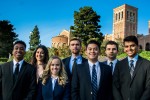Recent amendments to the Undergraduate Students Association Council Election Code could level the playing field for candidates running in this year’s undergraduate student government election, student leaders said.
USAC unanimously passed a series of amendments to the election code last month, including reimbursing candidates’ campaign spending with 10 percent of the election board’s total budget and limiting campaign spending for all candidates to $600. Ten percent of the board’s current budget, or $3,750, will be split evenly among candidates who report their campaigning expenses, said Jayesh Menon, the election board’s finance committee director.
Menon said candidates must report how much they spend on their campaign and where they spent their money. Candidates will be reimbursed for their expenditures if the board determines their spending was valid.
“I proposed a reimbursement scheme in the first place because I was vocal about (electing candidates) who could represent students rather than candidates who could readily acquire funding,” he said.
Election board Chair Jack Price said he was also inspired to use student fees to partially reimburse the elections because he supports publicly funded elections at the federal level.
“As a board, we decided that money should not control elections and it should be about the voices of students,” he said. “But we wanted to make sure that the money that is used to amplify these voices is coming from the students as much as possible.”
Menon added he thinks money can be a barrier to some students interested in running and candidates with more funds are at an advantage.
“If you have enough funds you can really advertise for yourself and your platforms,” he said. “So we thought doing this would be an incentive for students (without a lot of funds) to join the election and run for candidacy.”
Price said he thinks the increase in students who attended this year’s candidate orientation is a sign that the election code changes have given more students an incentive to run for office. This year, 45 candidates attended the orientation, while 22 candidates attended last year.
“As far as I know, it is unprecedented,” he said.
For example, if 39 candidates were to run, they would be eligible to be reimbursed about $95 each.
Price added he thinks candidates will be incentivized to spend less in the election because they will only be reimbursed for a fraction of their spending.
The election board decided to use $600 as the uniform campaign spending limit because that was the median spending amount over the last couple of years, Price said.
“We chose to peg our spending limit to that and a little under because we want to encourage thrift,” he said.
Last year, students running for executive positions had a spending limit of about $900 while students running for nonexecutive positions had a spending limit of about $700. Slates also had their own spending limits, able to spend up to $200 per person.
“It sends a message that one race matters more than another, when all hold an equal seat at the table and are all equally important,” Menon said.
Divya Sharma, USAC academic affairs commissioner, said he thinks the election code changes address some of the funding problems he experienced while running independently last year.
“It was hard because you don’t have that huge amount of money that a slate would have when you’re running independently,” he said. “It wasn’t an issue staying within a budget, it was an issue when slates had more money.”
Voting will take place on MyUCLA from April 30 to May 4.
